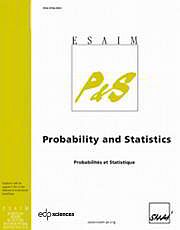Article contents
Smoothness of Metropolis-Hastings algorithm and application to entropy estimation
Published online by Cambridge University Press: 21 May 2013
Abstract
The transition kernel of the well-known Metropolis-Hastings (MH) algorithm has a point mass at the chain’s current position, which prevent direct smoothness properties to be derived for the successive densities of marginals issued from this algorithm. We show here that under mild smoothness assumption on the MH algorithm “input” densities (the initial, proposal and target distributions), propagation of a Lipschitz condition for the iterative densities can be proved. This allows us to build a consistent nonparametric estimate of the entropy for these iterative densities. This theoretical study can be viewed as a building block for a more general MCMC evaluation tool grounded on such estimates.
- Type
- Research Article
- Information
- Copyright
- © EDP Sciences, SMAI, 2013
References
- 1
- Cited by




